
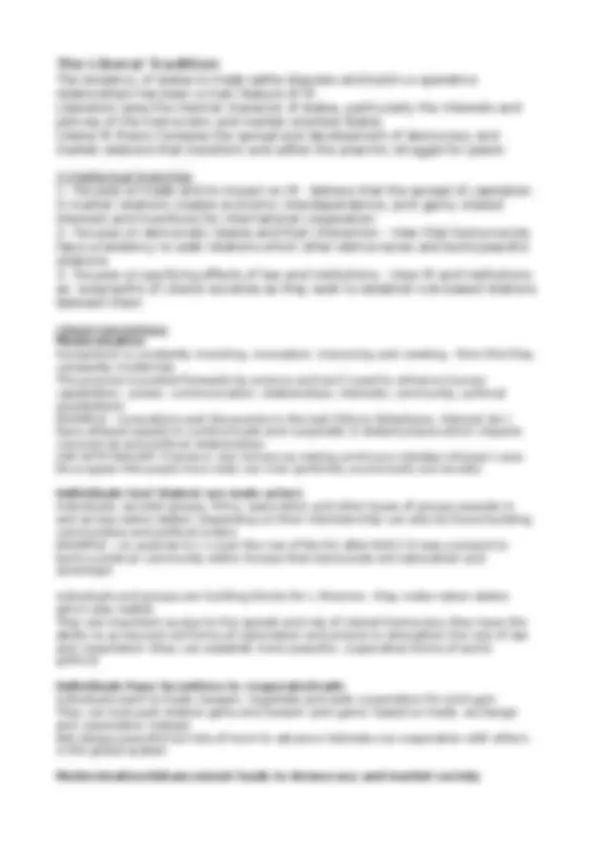
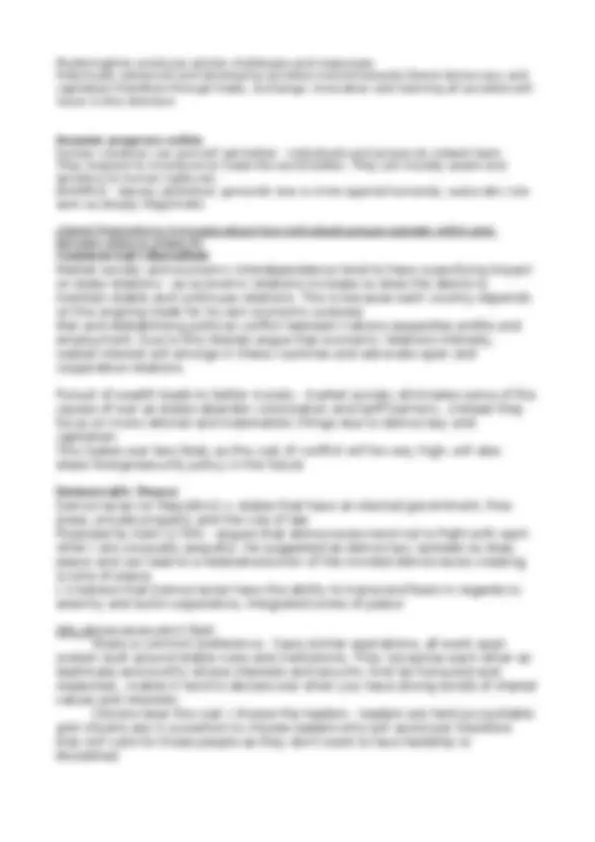
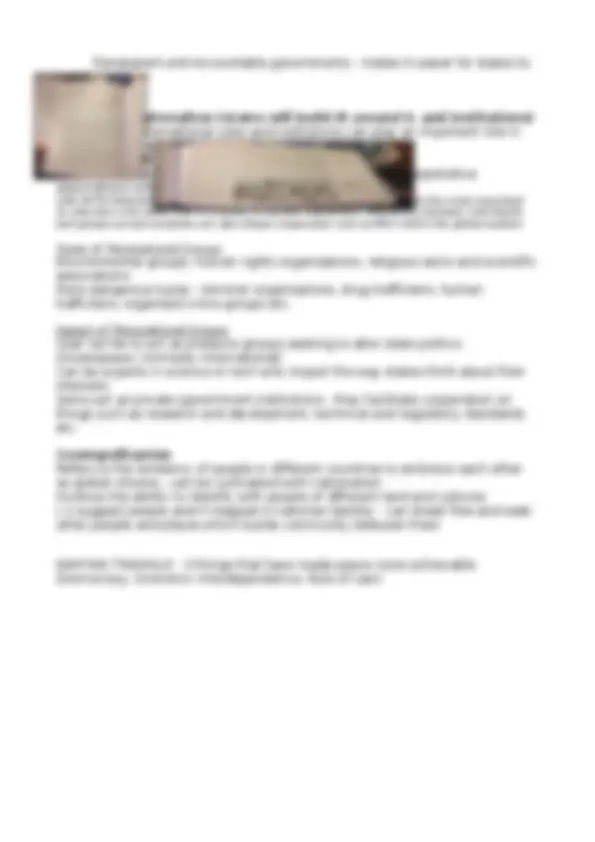
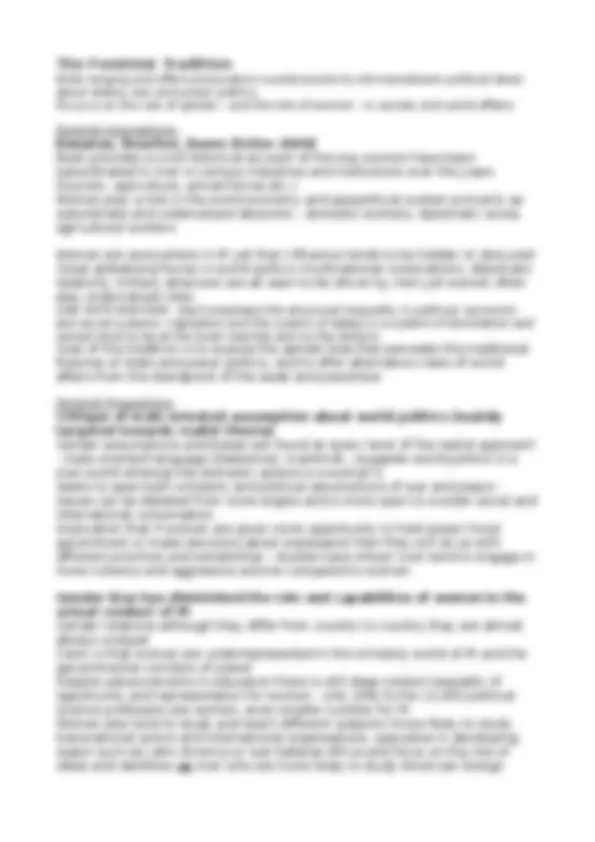
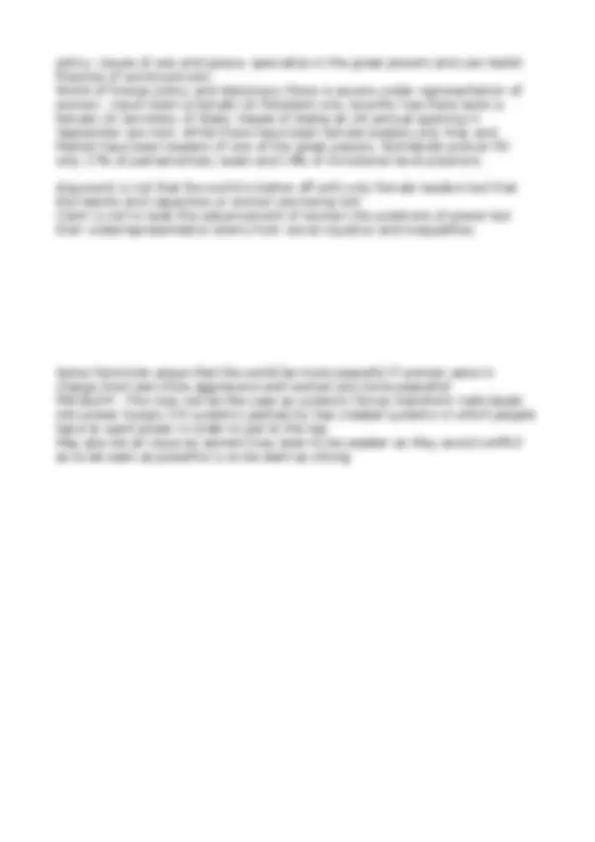


Study with the several resources on Docsity

Earn points by helping other students or get them with a premium plan


Prepare for your exams
Study with the several resources on Docsity

Earn points to download
Earn points by helping other students or get them with a premium plan
Community
Ask the community for help and clear up your study doubts
Discover the best universities in your country according to Docsity users
Free resources
Download our free guides on studying techniques, anxiety management strategies, and thesis advice from Docsity tutors
Theories of IR (Realism, Liberalism, Feminism etc)
Typology: Study notes
1 / 9

This page cannot be seen from the preview
Don't miss anything!






THEORIES IN INTERNATIONAL RELATIONS
Realist Assumptions Sees competition for power among groups/states as the central and enduing feature of IR
No higher authority to watch states - operate in a world of anarchy (states left to their own devices) This means that power is the most important ‘coin of the realm’ in which states use it as a currency. ARGUMENT - powerful prevail and weak submit Due to anarchy, states seek to increase their power in order to remain secure and protect themselves
States are the main actors in IR Other actors may appear (organisations, private corporations etc.) but states will always be the most important actor on the world stage Due to anarchy, people divide themselves into groups (these days this is states) Governments offer protection, citizens are tied to the state as well as other citizens
States are reasonable rational actors They recognise the situation they are in and the risks involved - look at the perspective benefits and losses and act accordingly (so that the positives outweigh the negatives) PROBLEM - sometimes state don’t act like this which is a weakness of this theory…EXAMPLE - Germany / Japan Expansionist Plans (1930s)…major cost in that they were aggressive and opened themselves up to conflict and war which outweighed the positives they were aiming for
Security is a central problem Leaders can horizon for threats and dangers and spread values in order to create open trading systems - this opens them up to attack and exploitation During times of war or hardship, civility it stripped away and states are laid bare in order to survive
Search for security is competitive All states want to get more powerful - although peace and cooperation can be achieved temporarily states are looking out for themselves, they aim to exploit opportunities to gain advantages There are winners and losers - if some states get more powerful then out of necessity others grow weaker Some states are richer (which goes hand in hand with power) therefore they are more secure
Realist Propositions Balance of Power A strategy that states employ in order to protect themselves - other states are gaining power and are becoming more threatening EXAMPLE - if one state gains lots of military power (fighting aircraft and tanks) then a threatened state may also seek to amass its own military power. If they gain enough military power then the initial threatening state may be less likely to attack and this power is used to neutralise/balance power
Balance Power - Forming Coalition Form coalition with other states with enough collective military power to counter-balance the treating state Old Tendency - Rise of a powerful state triggers the formation of a coalition of states in order to protect themselves by counterbalancing the rising state EXAMPLE - Great Britain formed a coalition with other European nations in order to counterbalance Napoleonic France The US and the Soviet Union formed alliances with many countries in order or balance each other, each aimed to gain enough military power to keep the other in check
The Security Dilemma When one state seeks to make itself more secure but in doing so threatens another state which triggers the threatened state to acquire its own military power - the end result is both states are less secure than when they started This can lead to a reciprocal dynamic or arms race - states taking defensive steps to ensure security triggers reactions which leads to counter reactions and then counter-counter reactions and so on…really both just want to protect themselves but this may be seen as aggression or offence from neighbouring states
Balance Power - Forming Alliances (temporary alliances that combine military power to guard/deter against a common enemy) Most famous / long lasting is NATO - established in 1949 in order for the US and its European partners to protect itself from the Soviet Union Continues after the Cold War and remained an organisation which uses its military capabilities for various conflicts around Europe This is the main form of co-operation among states for Realists
Relative Gains These are gains which focus the gains a state makes compared to its rival Due to anarchy states must look at how their decisions influence other states Although there is a focus on the overall absolute gain that a state makes there is now more of a focus on relative gains - states may be hesitant to enter into trades, alliances etc. if they believe that the rival state will make significant gains from this and thus increase their overall power
EXAMPLE - CHINA AND THE US Concerns over whether US trade with China helps increase China’s relative power - which may negatively impact the US in the future Although the US in absolute terms is gaining as well the realist worry is that other states will gain more over time thus giving them advantage Therefore realists argue that states exhibit tendencies to make choices based on relative benefits
Power Transitions When a rising state increases it power and moves to surpass an older, declining state Problem occurs as the international system must cope with this change (EH Carr) - can lead to conflict (declining state wants to keep its status and feels threatened while the rising state seeks respect/recognition) These transitions don’t always end in war - EXAMPLE…US overtook GB through a peaceful translation when it helped with the Germany situation EXAMPLE - Germany rose up in the late 19th century to challenge GB
Nationalism Describes the political identity that people share or a sense of collective fate as a political community Realists emphasise the point that nationalism and loyalty to the nation state provide the foundation for dominance - it is a source of conflict that encourages groups of people to highlight the differences between themselves and other groups
Disagreements within Realist Theory - Anarchy tends to make states bold, aggressive vs. Anarchy tends to encourage states to be cautious and defensive Agree that IR is a struggle for power and security among nation-states
Modernisation produces similar challenges and responses Historically advanced and developing societies moved towards liberal democracy and capitalism therefore through trade, exchange, innovation and learning all societies will move in this direction
Assume progress exists Human condition can and will get better - individuals and groups do indeed learn They respond to incentives to make the world better, They are morally aware and sensitive to human rights etc. EXAMPLE - slavery abolished, genocide now a crime against humanity, autocratic rule seen as deeply illegitimate
Liberal Propositions (concepts about how individuals.groups operate within and between state to shape IR) Commercial Liberalism Market society and economic interdependence tend to have a pacifying impact on state relations - as economic relations increase so does the desire to maintain stable and continues relations. This is because each country depends on the ongoing trade for its own economic purpose War and destabilising political conflict between nations jeopardise profits and employment. Due to this liberals argue that economic relations intensity, vested interest will emerge in these countries and advocate open and cooperative relations
Pursuit of wealth leads to better morals - market society eliminates some of the causes of war as states abandon colonisation and tariff barriers…instead they focus on more rational and materialistic things due to democracy and capitalism This makes war less likely as the cost of conflict will be very high, will also share foreign/security policy in the future
Democratic Peace Democracies (or Republics) = states that have an elected government, free press, private property and the rule of law Proposed by Kant (1795) - argues that democracies tend not to fight with each other / are unusually peaceful. He suggested as democracy spreads so does peace and can lead to a federation/union of like minded democracies creating a zone of peace L’s believe that Democracies have the ability to transcend fears in regards to anarchy and build cooperative, integrated zones of peace
Why democracies don’t fight Share a common preference - have similar aspirations, all want open system built around stable rules and institutions. They recognise each other as legitimate and worthy whose interests and security mist be honoured and respected…makes it hard to declare war when you have strong bonds of shared values and interests Citizens bear the cost / choose the leaders - leaders are held accountable and citizens are in a position to choose leaders who will avoid war therefore they will vote for those people as they don’t want to face hardship or bloodshed
Transparent and Accountable governments - makes it easier for states to trust/cooperate
Liberal Institutionalism (states will build IR around IL and institutions) ARGUMENT - international rules and institutions can play an important role in shaping the operation of relations among states Transnationalism Refers to the tendency of groups within countries to build cooperative associations with groups in other countries LINK WITH REALISM - Realism believes that state to state interactions are the most important vs Liberals’s who state that it’s society to society interaction, interaction between individuals and groups across societies can also shape cooperation and conflict within the global system
Types of Transnational Groups Environmental groups, human rights organisations, religious sects and scientific associations More dangerous types - terrorist organisations, drug traffickers, human traffickers, organised crime groups etc.
Impact of Transnational Groups Goal can be to act as pressure groups seeking to alter state politics (Greenpeace / Amnesty international) Can be experts in science or tech who impact the way states think about their interests Some act as private government institutions - they facilitate cooperation on things such as research and development, technical and regulatory standards etc.
Cosmopolitanism Refers to the tendency of people in different countries to embrace each other as global citizens…can be contrasted with nationalism Involves the ability to identify with people of different land and cultures L’s suggest people aren’t trapped in national identity - can break free and seek other people and places which builds community between them
KANTIAN TRIANGLE - 3 things that have made peace more achievable (Democracy, Economic Interdependence, Rule of Law)
Rivals but not enemies - States view each other as rivals but not enemies. Not interested in conquering but seek to preserve status quo, respect the rights of others to exist and only use force for defensive purpose Friends - States cooperate to maximise collective gains, use of force is generally viewed as illegitimate, sovereignty is respected and collective security replaces national security States operate within a global civil society Civil Society - realm of private activity that lies outside the political system. Exists within countries but also operates between them (often as transnational groups)
Global Civil Society - Is in effect the sum total of these transnational groups This is what facilitates elite learning and socialisation, providing communication networks though which elites develop ideas and identities that shape state policy
AGREE WITH LIBERALISM - transnational networks/exchanges are important mechanisms for spreading norms and ideas, for building trust and consensus among countries
Normative change is a major way in which world politics evolves ARGUMENT - learning and socialisation that takes place across the global system tends to move in a progressive direction. Norms do change and often for the better (but not always) EXAMPLES - Slavery was outlawed at the end of the 19th century, apartheid ended in South Africa in the 1980s, new norms of humanitarian intervention emerged
State elites exist within and are influenced by strategic culture Strategic culture = assumptions about the nature of the global system (example - which states are enemies and friends) and strategies fo action that are shared by government elites States have different Strategic cultures due to differences rooted in specific historical experiences / national security lessons - these differences gives state distinctive personalities
Wide ranging and offers provocative counter-points to old mainstream political ideas about states, war and power politics Focus is on the role of gender - and the role of women - in society and world affairs
Feminist Assumptions Bananas, Beaches, Bases (Enloe 2000) Book provides a vivid historical account of the way women have been subordinated to men in various industries and institutions over the years (tourism, agriculture, armed forces etc.) Women play a role in the world economy and geopolitical system primarily as subordinate and undervalued labourers - domestic workers, diplomatic wives, agricultural workers
Women are everywhere in IR yet their influence tends to be hidden or obscured Great globalising forces in world politics (multinational corporations, diplomatic relations, military alliances) are all seen to be driven by men yet women often play undervalued roles LINK WITH MARXISM - Each emphasis the structural inequality in political, economic and social systems. Capitalism and the system of states is a system of domination and women tend to be at the lower reaches and on the bottom. Goal of this tradition is to expose the gender bias that pervades the traditional theories of state and power politics, and to offer alternative views of world affairs from the standpoint of the weak and powerless
Feminist Propositions Critique of male oriented assumption about world politics (mainly targeted towards realist theory) Gender assumptions and biases are found at every level of the realist approach
Gender bias has diminished the role and capabilities of women in the actual conduct of IR Gender relations although they differ from country to country they are almost always unequal Claim is that women are underrepresented in the scholarly world of IR and the governmental corridors of power Despite advancements in education there is still deep-rooted inequality of opportunity and representation for women - only 26% fo the 13,000 political science professors are women, even smaller number for IR Women also tend to study and teach different subjects (more likely to study transnational actors and international organisations, specialise in developing region such as Latin America or sub-Saharan Africa and focus on the role of ideas and identities vs men who are more likely to study American foreign